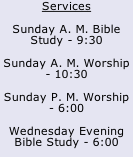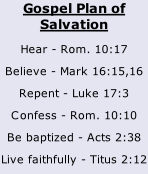Inspired Old Testament prophets from Samuel (II Sam. 7:11-16) to Isaiah (Isaiah 2:1-4) having foretold of it's establishment (Acts 3:24), the church of Christ (Rom. 16:16) was founded on the first Pentecost after the Lord's resurrection (Matt. 16:13-20; Acts 2:1-47). Thus, the Lord's church was not an afterthought but was in God's plan from the beginning of time (Eph. 3:9-11). In the Lord's church, His body, ({i.e, in Him} Eph. 1:22,23; Col. 1:18) are all spiritual blessings (Eph. 1:3). Salvation is found only in Christ (Acts 4:12); thus, salvation is found only in His church (Acts 2:47). The New Testament provides a pattern for the organization, nomenclature, worship, and terms of entrance into the church of Christ (I Pet. 4:11; Heb. 8:5; Col. 3:17; Eph. 4:5, et. al.).
Organization
Christ is the head of His church (Col. 1:18). Thus, the church of Christ has no earthly headquarters. Each local congregation of the Lord's people is completely autonomous, being governed by a plurality of elders (Acts 14:23; Titus 1:5) also styled bishops (cf. I Tim. 3:1-7), overseers (Acts 20:17, 28), shepherds (I Pet. 5:1-4), pastors (Eph. 4:11), and presbyters (I Tim. 4:14). These men must meet certain qualifications (I Tim. 3:1-7; Titus 1:5-16), as do the men who become deacons ("servants"-I Tim. 3:8-13). The eldership governs the congregation (Heb. 13:17; I Tim. 3:4,5) but does not "lord it over" the flock of God's heritage (I Pet. 5:1-4).
Name
From the time God named Adam and Eve (Gen. 5:2), Abram and Sarai (Gen. 17:5,15), and Jacob (Gen. 32:27,28), to the glorification of the name of Jesus (Phil. 2:9,10), names have always been important to God. Through the prophets of the Old Testament, God promised a new name to His people (Isaiah 62:2; 65:15). This promise was fulfilled in Antioch of Syria where "the disciples were called Christians first" (Acts 11:26). Apart from the name of Jesus Christ, there is no other name "under heaven given among men whereby we must be saved" (Acts 4:12). There were no "hyphenated Christians" in the first century; only Christians (Acts 11:26; 26:28; I Pet. 4:16). Just as it would be wrong for a woman to wear a name other than her husband's, it would be wrong for the bride of Christ, the church (II Cor. 11:2; Rev. 21:2), to wear a name other than Jesus' name, thereby causing division (I Cor. 1:10-13; 12:25; John 17:1-26). Though there are descriptive terms used in the New Testament to refer to the followers of Christ (e.g., "disciples" (Acts 20:7), "saints" (I Cor. 1:2; et. al.), "brethren" (I Cor. 15:6; et. al.)), "Christian" is the name given of God.
Jesus said He would build His church (Matt. 16:18); therefore, it is called the church of Christ (Rom. 16:16). The New Testament refers to the church in other terms, such as "the church" (Acts 8:1) or "the church of God" (I Cor. 1:2). However, in all things pertaining to the church Christ is to have preeminence (Col. 1:18). An imprecation is placed on all who would dilute the truth of God's word by adding to it (Rev. 22:18).
Worship
In order to worship God acceptably, one must worship with the proper attitude and according to the commands God has given (John 4:24). Vain worship results when God's pattern for worship is altered from the holy pattern (cf. Heb. 8:5) to a man-made system of traditions (Matt. 15:8,9; cf. Lev. 10:1,2). In the New Testament, first century Christians worshipped on the first day of the week to commemorate the death, burial, and resurrection of Christ by partaking of the Lord's supper (Acts 20:7). Preaching and teaching was an essential part of the worship of New Testament Christians (Acts 20:7; 2:42). Christians gave of their means on the first day of the week as they were prospered (I Cor. 16:1,2) and they gave cheerfully as they purposed in their hearts (II Cor. 9:8). Worship in song was an integral part of first century, Christian worship (Acts 16:25). There was no use of the instrument in worship as the singing was a capella (Eph. 5:19; Col. 3:16; Heb. 2:12). Finally, prayer was uttered toward heaven as an act of worship (Acts 2:42; 12:5; I Tim. 2:1- 3, 8). Those who corrupted this simple pattern of worship with man-made innovations were condemned (I Cor. 11:18-34).
Terms of Entrance
One cannot "join the church" of Christ; rather, the Lord, Himself, adds the saved to it (Acts 2:47). As the Lord adds, it is the Lord who calls (Rom. 8:29,30). He calls, however, by means of the gospel (II Thess. 2:14). Therefore, one must first hear the word of God (i.e., the gospel) for faith to be produced (Rom. 10:16,17), without which one cannot be pleasing to God (Heb. 11:6). Upon hearing and believing that Jesus is the Christ, the son of the living God, one will repent of his sins (Acts 17:30,31; Luke 13:3), confess his belief in Christ (Acts 8:36-38; Rom. 10:10), and be baptized for ("in order to" obtain) the remission of sins (Mark 16:15,16; Acts 2:38; 22:16; I Pet. 3:21). At baptism, one is added to the Lord's church (Acts 2:41,47), raised from the watery grave to walk in newness of life (Rom. 6:1-4), and made an heir "according to the hope of eternal life" (Tit. 3:5-7). All who do not obey the gospel of Christ will be punished with everlasting destruction in flaming fire from the presence of the Lord and from the glory of His power (II Thess. 1:7-10).
Upon being added to the Lord's church, one must continue to live a life of holiness and godliness (Col. 3:1-25; I Pet. 1:13-2:25). One will earnestly tell others of the gospel of Christ (Matt. 28:18-20; Acts 5:42; 8:4), be faithful in attendance to the services of the Lord's church (Heb. 10:28), be benevolent to the deserving needy (Gal. 6:10; James 1:27), study the Bible diligently and daily (II Tim. 2:15; Acts 17:11), and grow in every good way in Christ (II Pet. 3:18; I Cor. 15:58).
Eric L. Padgett











